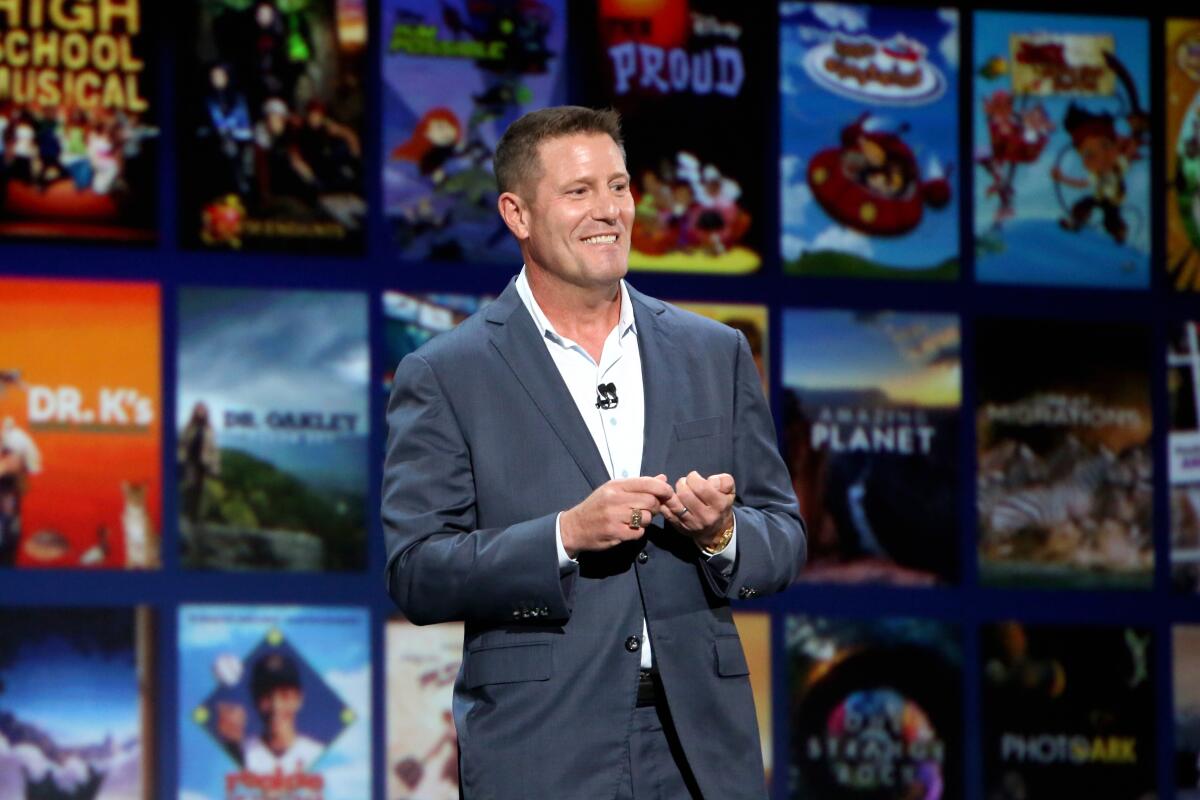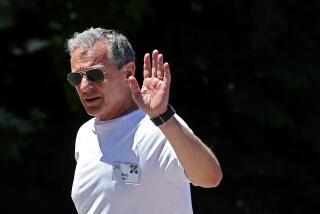He didn’t get the Disney CEO job, but Kevin Mayer still holds keys to the kingdom

- Share via
Walt Disney Co.’s surprise appointment of Bob Chapek as its chief executive answered the lingering mystery of who would run the company after Bob Iger’s 15-year reign.
For investors, though, it raised additional questions for the company.
All eyes remain on Kevin Mayer, who has his hands full at Disney running its crucial streaming business. Many thought Mayer, who is chairman of Disney’s direct-to-consumer and international segment, would have been a logical choice for the CEO job, given his role leading what Iger has deemed the company’s top priority. The unit, so far at least, has also been highly successful. Disney+ hit 28.6 million subscribers last month, surpassing industry expectations.
Some analysts have speculated about whether Mayer will remain with the company. Barclays managing director Kannan Venkateshwar said in a recent note to clients that Mayer’s future was “[o]ne of the concerns expressed by investors.”
Iger tried to quell those worries in a meeting with Wall Street analysts last week. Iger “indicated that [Mayer] had been considered for the CEO job” but “was confident Mayer would be fine,” Venkateshwar wrote.
Indeed, Disney insiders and people who know Mayer said it is unlikely he will depart, given the high-profile nature of his current job. For a media executive, there aren’t many positions in entertainment, media or tech that are more interesting than that of leading Disney’s charge into subscription video. And Mayer, 57, could be in a good position to eventually succeed Chapek.
“Kevin Mayer still gets to lead the most important part of the company, so I could see him and Chapek working well together,” said Andrew Choi, senior research analyst at Parnassus Investments, a San Francisco firm that holds more than $800 million in Disney stock.
Disney declined to make Mayer and other executives available to comment.
Major decisions loom. The company must figure out who will take over parks, experiences and products in Chapek’s stead, at a time when the coronavirus epidemic is sowing panic, shutting down theme parks and curtailing tourism.
Additionally, there’s the question of whether Disney will appoint a No. 2 under Chapek, as has traditionally been part of the Burbank entertainment giant’s management structure. Disney also eventually will have to decide who will lead its highly successful collection of movie studios once Alan Horn, 77, retires. Horn last year renewed his contract for an unspecified number of years, as the studio’s main business executive, Alan Bergman, was elevated to co-chair alongside him.
People close to the company noted that Disney has a strong bench of executives who could take over Chapek’s former role in parks and products, and that the firm is in no rush to install someone. Disney’s parks veterans include Walt Disney World Resort President Josh D’Amaro, Disneyland Resorts President Rebecca Campbell and Disney Parks International President Michael A. Colglazier.
Chapek, meanwhile, has spent 27 years at various divisions, including the last few years overseeing 170,000 parks and resorts employees, making him well-suited to lead Disney through the crisis, analysts said.
“Chapek is very good on the execution side,” said Steven Kaplan, a professor and corporate governance expert at the University of Chicago’s Booth School of Business. “He makes decisions and gets things done.”
He faces steep challenges ahead. The virus outbreak has already shut down Disney’s resorts in Shanghai and Hong Kong for weeks, and it remains unclear how attendance at other parks might be affected as the virus spreads in the U.S. and Europe. Disney’s studios may also feel the pain. No one knows when Disney will be able to release its live-action remake of “Mulan” in Chinese theaters, the vast majority of which remain closed. “Mulan” is set to hit U.S. cinemas March 27.
“Disney is in the same boat as everyone else,” said Doug Creutz, a media analyst at Cowen & Co. “No one knows how this is going to go. Their primary concern is the safety of the customers and employees. Chapek understands this as well as anyone.”
Chapek’s selection came shortly before Disney’s annual shareholder meeting, taking place Wednesday in Raleigh, N.C. The Q&A sessions at Disney’s annual meetings have traditionally veered between serious business topics — including Iger’s pay and the health of ESPN — and lighthearted queries about the availability of Pixar studio tours. This year, the leadership could face tough questions about management plans and the coronavirus outbreak.
The timing of the succession announcement threw some investors for a loop, coming just as the coronavirus situation began to escalate outside China. Iger stepped down with 22 months left on his contract, saying he wanted to focus on the creative side of the business, while handing day-to-day management to Chapek. Disney stock, which has enjoyed years of increases under Iger, sank last week amid the executive change and pandemic fears.
Disney shares closed at $115.27 on Friday, up $1.29, or 1.1%.
The abrupt announcement also surprised Disney insiders. Iger’s senior team, including Mayer, didn’t learn of the move until shortly before Disney issued a press release that announced Chapek’s elevation. That morning, Mayer had appointed a new president of Hulu and was at a town hall meeting at Hulu’s Santa Monica headquarters.
Some industry observers shrugged off the timing, however. “The alternative view is, when would be a good time to announce this?” Choi said. “I struggle to think of when it would be a good time to announce a hall-of-fame executive is stepping down.”
Some of the biggest hurdles for Disney fall to Mayer, who must work closely with Iger and Chapek to grow Disney+ by increasing programming and expanding globally. Mayer is also tasked with growing Hulu, which has been under Disney control since last year. Hulu is a key part of Disney’s streaming strategy, as the new home of programming from FX Networks. The service also must pursue its long-awaited international expansion.
“There’s still been a relative lack of clarity around Hulu, compared to Disney+,” Creutz said.
People close to Mayer and Chapek said the executives get along well. Both are longtime Disney insiders and exacting bosses who have touched multiple parts of Disney’s empire. The interconnected nature of Disney’s numerous businesses — theme parks, cruise ships, Broadway plays, movies and TV shows, toys and so on — requires division heads to collaborate more frequently than at more siloed rival companies.
For example, “The Imagineering Story,” a documentary miniseries about the history and creation of Disney theme parks, was produced for Disney+.
Mayer, who holds an MBA from Harvard University, joined Disney in 1993, the same year as Chapek, in the strategic planning division. Intense and highly focused, he rose through the ranks to become head of Disney’s internet group before leaving to run Playboy Enterprises’ digital subsidiary.
After stints at Clear Channel and L.E.K. Consulting, Mayer returned to Disney in 2005, when Iger became CEO. He came in as head of strategic planning, which Iger had reduced to 15 employees from 65 after years of what he saw as too much power concentrated in the division.
Since then, Mayer oversaw the blockbuster acquisitions that made Disney the dominant force it is today, including Pixar Animation Studios, Marvel Entertainment, Lucasfilm and 21st Century Fox Inc. One key deal was Disney’s takeover of technology company BAMTech, which provided the backbone of Disney’s streaming services. Less successful were the acquisitions of YouTube creator network Maker Studios and online game maker Club Penguin.
In the acknowledgments section of Iger’s 2019 book, “The Ride of a Lifetime,” he described Mayer as “a master strategist and dealmaker.”
“A CEO couldn’t ask for a better strategic partner,” Iger wrote.
There’s also no saying Mayer won’t have another shot at the CEO job sometime in the future. Barclays’ Venkateshwar floated the idea that Mayer could eventually be named chief operating officer under Chapek, who is 60, but cautioned there was no indication from management that this was in the cards.
For now, Disney appears to want to keep Mayer focused on building out the streaming platforms. And Wall Street will be paying close attention to the subscriber numbers.
“Kevin’s still got a pretty important job,” Creutz said. “You could say he’s still in charge of the future of the company.”
Times staff writers Meg James and Stacy Perman contributed to this report.
More to Read
Inside the business of entertainment
The Wide Shot brings you news, analysis and insights on everything from streaming wars to production — and what it all means for the future.
You may occasionally receive promotional content from the Los Angeles Times.











